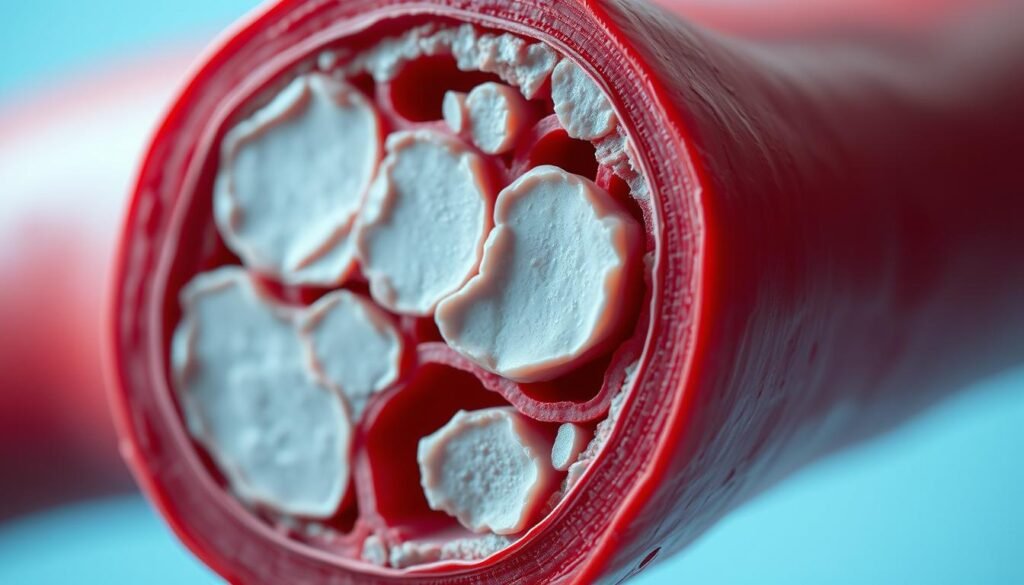Have you thought about how cholesterol affects your heart? High cholesterol is a hidden danger to heart health and more. It can lead to heart disease and stroke. It’s vital everyone knows these risks for better health. High cholesterol means higher chances of heart problems. To understand this link better, check out this helpful resource.
Key Takeaways
- High cholesterol significantly increases the risk of heart disease.
- Understanding cholesterol types is crucial for managing heart health.
- Routine tests can help monitor cholesterol levels effectively.
- Implementing lifestyle changes can mitigate health risks related to high cholesterol.
- Awareness of cholesterol’s impact on overall health is vital for prevention.
- Regular exercise and a balanced diet improve cholesterol management.
Understanding Cholesterol and Its Types
Cholesterol is a waxy substance in every cell. It’s crucial for making hormones, vitamin D, and bile acids for digesting fat. Knowing about cholesterol and its types is key for health.
What Is Cholesterol?
Cholesterol moves through the blood attached to proteins, forming lipoproteins. It is key for cells’ structure and function. While our bodies make it, food can affect cholesterol levels too. Keeping cholesterol balanced is important for health.
Types of Cholesterol: LDL vs. HDL
There are two main cholesterol types. LDL cholesterol, or low-density lipoprotein, is called “bad” cholesterol. Too much LDL can cause plaque buildup in arteries, raising heart disease risk. On the other hand, HDL cholesterol, or high-density lipoprotein, is “good” cholesterol. It helps carry LDL cholesterol to the liver for removal. Knowing the differences between these types can help your heart stay healthy.
| Cholesterol Type | Density | Common Name | Function |
|---|---|---|---|
| LDL | Low | Bad Cholesterol | Transports cholesterol to cells; high levels can lead to plaque buildup |
| HDL | High | Good Cholesterol | Removes excess cholesterol from bloodstream; protects against heart disease |
It’s vital to keep LDL and HDL cholesterol balanced for your heart. Regular check-ups can help manage risks from cholesterol levels.
Health Risks of High Cholesterol
High cholesterol is a major health issue that can affect your heart and overall health. It’s especially worrisome because high levels of bad (LDL) cholesterol can cause plaque to build up in the arteries. This makes arteries narrow and raises the risk of serious heart problems.
How High Cholesterol Affects Heart Health
High cholesterol is a big danger to heart health. It leads to plaque forming in arteries, causing a condition known as atherosclerosis. This condition makes arteries hard and narrow. As a result, the heart has a hard time getting enough blood, which can cause heart attacks and other heart issues. Keeping cholesterol levels in check helps the heart work well and reduces disease risk.
The Link Between High Cholesterol and Stroke
High cholesterol also increases the risk of stroke. It can cause arteries to get blocked, leading to a stroke. If plaque narrows arteries, blood flow to the brain gets blocked, making strokes more likely. Knowing about this connection helps with prevention and keeping the heart healthy.
| Health Risk | Impact |
|---|---|
| Plaque buildup | Narrows arteries, increasing heart attack risk |
| Atherosclerosis | Hardens arteries, impairs blood flow |
| Stroke risk | Blocked arteries leading to reduced brain blood flow |
| Heart disease | Increased likelihood of serious cardiovascular conditions |
The Role of Lipid Profile in Assessing Cholesterol Levels
A lipid profile is key for checking cholesterol in the blood. It shows different parts, telling us about heart health. Knowing what your lipid profile says helps manage heart risks.
What Is a Lipid Profile?
A lipid profile tests for various cholesterols and triglycerides. It includes:
- Total cholesterol
- Low-density lipoprotein (LDL)
- High-density lipoprotein (HDL)
- Triglycerides
Each part has its own role in heart risk. High LDL is bad, it can lead to heart disease. HDL is the good cholesterol, protecting us.
Interpreting Lipid Profile Results
Knowing what your lipid profile means is vital. It shows if there’s a higher heart disease risk. Here’s what each part should be:
| Component | Optimal Level | Borderline High | High |
|---|---|---|---|
| Total Cholesterol | Less than 200 mg/dL | 200-239 mg/dL | 240 mg/dL and above |
| LDL Cholesterol | Less than 100 mg/dL | 100-129 mg/dL | 130 mg/dL and above |
| HDL Cholesterol | 60 mg/dL and above | 40-59 mg/dL | Less than 40 mg/dL |
| Triglycerides | Less than 150 mg/dL | 150-199 mg/dL | 200 mg/dL and above |
Talk to doctors to fully understand your results. They will look at your family history and risk factors. Regular checks can help you stay healthy. For more info, check out the National Institutes of Health.
Atherosclerosis: The Silent Threat
Atherosclerosis is a big health risk. It causes thick and hard arteries because of plaque. It’s called a silent threat because it can get worse without any signs until it’s severe.
What Is Atherosclerosis?
Atherosclerosis happens when fatty stuff and cholesterol pile up in arteries. This makes plaques. Over time, these plaques can make arteries narrow, and blood has a hard time getting to organs. It’s important to understand this to grasp its effects on heart health.
How High Cholesterol Contributes to Atherosclerosis
High cholesterol is a key player in atherosclerosis. If your cholesterol is too high, you’re more likely to get plaque. Too much low-density lipoprotein (LDL) cholesterol is especially bad. It leads to fatty buildups in arteries. Keeping cholesterol in check is crucial to stop atherosclerosis and its dangerous outcomes.

Understanding LDL Cholesterol and Its Impact
LDL cholesterol is often called “bad” cholesterol. It is harmful when its levels get too high. This waxy substance can build up in your blood vessels. This buildup can lead to heart disease or stroke. Knowing about LDL’s dangers helps keep your heart healthy.
The Dangers of Elevated LDL Levels
High LDL cholesterol levels can put you at risk for heart problems. It causes plaque to form in your arteries, making them narrow. This can lead to heart attacks and strokes. It’s important to check your LDL levels regularly. This is especially true if heart disease runs in your family. Learning and taking steps to prevent it is crucial.
Managing LDL Cholesterol
To control LDL, change your lifestyle and possibly take medication. Your diet is very important. Eat healthy fats from fish and nuts and lots of fruits and veggies. This can lower LDL cholesterol. Also, be active for 150 minutes each week. Your doctor might suggest medication. Talk to them to find the best plan for you. For more info, check this resource.
The Importance of HDL Cholesterol
HDL cholesterol, known as “good” cholesterol, is key for heart health. It is crucial for everyone to understand its importance. HDL moves cholesterol from arteries to the liver to be removed. This helps reduce heart disease and stroke risks.
Why HDL Cholesterol Matters
High HDL levels can decrease cardiovascular issues. Studies show people with higher HDL have fewer heart diseases. HDL removes extra cholesterol, protecting the heart. It’s important to keep track of HDL levels for good health.
Boosting HDL Cholesterol Levels Naturally
To improve heart health, many try to raise their HDL. Natural ways to increase HDL include:
- Regular Exercise: Activities like walking or biking boost HDL.
- Healthy Diet: Eating foods with healthy fats, such as avocados and nuts, helps.
- Quit Smoking: Stopping smoking can raise HDL levels.
- Weight Management: Keeping a healthy weight can also increase HDL.

Prioritizing HDL cholesterol is vital for heart health. Making lifestyle changes can raise HDL levels and improve heart health.
The Connection Between High Triglycerides and Cholesterol
It’s key to know how triglycerides and cholesterol affect heart health. Triglycerides are fats in our blood that impact health. If you eat more calories than needed, they turn into triglycerides, leading to high levels if unchecked.
Understanding Triglycerides
Triglycerides are important for storing energy. They come from fats and carbs we eat. If levels get too high due to overeating, drinking too much alcohol, or too many refined carbs, health risks can go up. It’s crucial to keep them in a healthy range.
How Triglyceride Levels Affect Overall Health
High triglycerides can lead to plaque buildup in arteries, risking heart disease. They can also cause other problems like pancreatitis. Watching these levels and eating a balanced diet helps manage triglycerides and cholesterol. For more insight, check the Centers for Disease Control and Prevention on this topic.
Lifestyle Changes to Manage Cholesterol Levels
Making lifestyle changes greatly helps in managing cholesterol. Implementing diet adjustments and exercising more can boost heart health. Here are some helpful strategies to try.
Dietary Adjustments for Heart Health
Diet is key in cholesterol management. Important dietary changes include:
- Increasing fiber with more fruits, vegetables, and whole grains.
- Reducing saturated fats found in red meat and full-fat dairy products.
- Adding heart-healthy foods like fatty fish, nuts, and olive oil.
Importance of Regular Exercise
Regular exercise is crucial for cholesterol control. It helps by:
- Raising HDL (good) cholesterol and lowering LDL (bad) cholesterol.
- Helping in weight management, which supports healthy cholesterol levels.
- Improving overall heart health and reducing high cholesterol risks.
Other Lifestyle Modifications
There are other important lifestyle changes for cholesterol management:
- Quitting smoking boosts HDL cholesterol and heart health.
- Moderate alcohol intake aids in maintaining a healthy lipid profile.
- Stress management through mindfulness benefits heart health.

With these lifestyle changes, managing cholesterol becomes easier. It improves life quality too.
Monitor Your Cholesterol: Testing and Frequency
Getting your cholesterol tested regularly is key to keeping your heart healthy. It helps prevent heart-related diseases. It’s important to know how often you should check your cholesterol since it greatly affects your health. The right testing frequency depends on various factors like your age and health history.
Here are some tips to help you figure out how often you need testing.
How Often Should You Get Your Cholesterol Tested?
How often you need a cholesterol test varies from person to person. According to the American Heart Association:
- Every adult over 20 should test their cholesterol every 4 to 6 years, depending on their initial results.
- If heart disease runs in your family, you might need to check your cholesterol more often.
- People over 40 should talk to their doctors to find out how often they should get tested.
What to Expect During a Cholesterol Test
Cholesterol tests are simple and quick. They mostly involve taking a blood sample to measure your body’s fats. Here’s what you need to know about the testing process:
- You might have to fast for 9 to 12 hours before the test for accurate readings.
- A medical professional will take blood from your arm.
- You should get your results in a few days, which will show your LDL, HDL, and triglyceride levels.
Conclusion
High cholesterol is a big risk to both heart and overall health. It can cause serious problems like atherosclerosis, heart attacks, and strokes. This shows why managing cholesterol is crucial.
By eating a heart-healthy diet and staying active, people can lower their cholesterol. It’s also important to keep a healthy weight. Regular tests help track cholesterol levels. People should work with doctors to adjust their plans if needed.
Keeping cholesterol in check is key to good health. Learning about it, changing your lifestyle, and going for check-ups can make a big difference. This way, everyone can aim for a healthier future and avoid the dangers of high cholesterol.